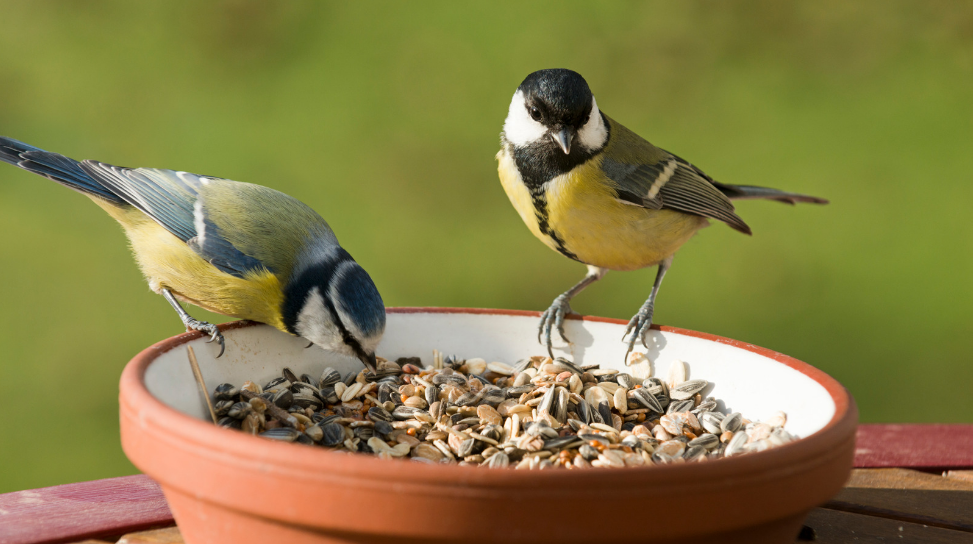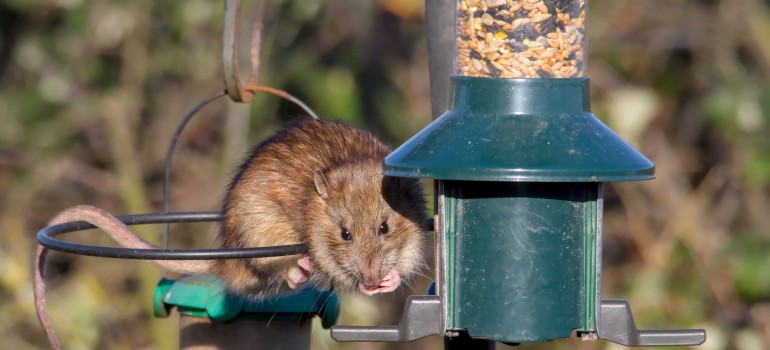Feeding birds can be a delightful activity that allows people to connect with nature and enjoy the beauty of these magnificent creatures. However, it is important to be mindful that bird feeders can also attract unwanted visitors in the form of rats and mice. In this article, the focus is on providing helpful tips for feeding birds without attracting rodents. These tips include using tube-style bird feeders, offering specific types of bird seeds such as Niger, safflower, and millet, regularly cleaning up spilled food, allowing bird feeders to go empty each day, storing bird seed properly in sealed containers, and using rodent deterrents like hot pepper bird seeds and sonic repellents. By following these tips, individuals can enjoy the presence of birds in their surroundings while keeping rodents at bay. If all else fails, temporarily stopping bird feeding and thoroughly cleaning the area can be a last resort to remove any remaining seed that may attract rodents.

Choose the right type of bird feeder and bird food to avoid attracting rodents
Feeding birds can be a delightful and fulfilling activity, but it’s important to take precautions to prevent attracting rodents. Rats and mice are notorious for seeking out food sources, and bird feeders can inadvertently become a feeding ground for these unwanted guests. However, by following a few simple guidelines, you can enjoy feeding birds while minimizing the risk of rodents invading your backyard.
Choose a tube-style bird feeder
When selecting a bird feeder, opt for a tube-style feeder. These feeders have smaller openings that make it more difficult for rodents to access the food. Tube-style feeders also provide a better barrier against rain, which helps prevent the seeds from becoming wet and soggy. By choosing this type of feeder, you’ll significantly reduce the chances of attracting rodents to your bird feeding station.
Offer Niger, safflower, and millet seeds
Not all bird seeds are created equal when it comes to deterring rodents. To minimize the risk of attracting them, consider offering Niger, safflower, and millet seeds. Rats and mice are less attracted to these types of seeds, making them a safer choice for bird feeders. Additionally, these seeds are highly nutritious and favored by many bird species, so you’ll still be able to attract a variety of feathered friends to your backyard.
Clean up spilled food under the bird feeder regularly
Even with the best of intentions, some bird food will inevitably end up on the ground. It’s crucial to regularly clean up any spilled food under the bird feeder to avoid attracting rodents. Rats and mice are opportunistic feeders and will quickly seize the chance to snack on the leftovers. By promptly removing the spilled food, you’re eliminating a potential food source for these unwanted visitors.
Clean up spilled food regularly
Make it a habit to clean up spilled bird food regularly. Use a small broom or rake to gather the spilled seeds and dispose of them properly. It’s essential to keep the area around the bird feeder clean and free from any food debris. Regular cleaning not only helps prevent rodents but also maintains a healthy and hygienic feeding environment for the birds.

Allow bird feeders to go empty each day to prevent attracting rodents
While it may be tempting to keep your bird feeders constantly stocked, allowing them to go empty each day can help deter rodents. By removing the food source, you’re significantly reducing the chances of attracting unwanted guests. Rats and mice will quickly lose interest and seek alternative food sources elsewhere. Additionally, allowing the feeders to go empty also promotes healthier feeding habits among the birds, as they learn to forage for food in different areas of your backyard.
Allow bird feeders to go empty each day
Make it a routine to remove any remaining bird food from the feeders at the end of each day. This will prevent rodents from discovering a consistent and reliable food source. By implementing this practice, you’ll be creating an environment that is less appealing to these unwanted visitors while still providing a safe and enjoyable feeding space for the birds.

Store bird food properly in sealed containers
Proper storage of bird food is essential to avoid attracting rodents to your backyard. Leaving seed bags open or exposing them to the elements can easily tempt rats and mice. To prevent this from happening, store bird seed in sealed containers that are rodent-proof. This will not only keep your bird food fresh but also deter rodents from sniffing out the tempting aroma. Sealed containers are a simple and effective way to protect your bird food and maintain a pest-free feeding area.
Store bird seed properly in sealed containers
Invest in sturdy, airtight containers specifically designed for storing bird seed. These containers are readily available and can be found at most pet stores or wildlife supply centers. Ensure that the lids fit tightly, leaving no space for rodents to squeeze their way in. By storing your bird seed in sealed containers, you’re taking a proactive step towards discouraging rodents from invading your backyard.

Use rodent deterrents and repellents like hot pepper and ultrasonic devices
In addition to choosing the right bird feeder and storing the food properly, there are other measures you can take to deter rodents from your backyard. Hot pepper bird seeds and ultrasonic devices are effective tools in keeping rats and mice at bay.
Use rodent deterrents such as hot pepper bird seeds and sonic repellents
Hot pepper bird seeds, also known as spicy seeds, contain capsaicin, a compound that birds are not sensitive to, but rodents find extremely unpalatable. By offering hot pepper bird seeds, you’re adding an extra layer of protection against rodents. These seeds are readily available at bird supply stores and are a safe and natural deterrent.
Ultrasonic devices emit high-frequency sounds that are unpleasant to rodents, yet inaudible to humans and most birds. By installing these devices near your bird feeders, you can create an environment that is unwelcoming to rodents. Ultrasonic repellents are easy to use and can be an effective tool in keeping rats and mice away from your backyard.

As a last resort, stop feeding birds temporarily and clean up the area to remove any remaining seed
If despite your best efforts, rodents continue to be a problem, it may be necessary to temporarily stop feeding birds and thoroughly clean up the area. By removing any remaining seed and eliminating the enticing food source, you’re taking a definitive step towards discouraging rodents from invading your backyard. During this break, assess your bird feeding setup, and make any necessary changes to prevent future rodent attractions. Once you’re confident that the area is free from rodents, you can resume feeding birds, taking extra precautions to prevent rodent access.
Stop feeding birds temporarily and clean up the area to remove any remaining seed
If rodents persistently infiltrate your bird feeding area, it may be time for a temporary halt in your feeding routine. Remove any remaining bird seed and thoroughly clean the area, ensuring that no traces of food are left behind. This break will allow you to reassess your bird feeding setup and implement additional measures to exclude rodents. Be diligent in monitoring the situation, and once you’re confident that the area is rodent-free, you can resume your bird feeding activities with renewed peace of mind.
By choosing the right type of bird feeder, offering specific bird seeds, cleaning up spilled food regularly, allowing feeders to go empty each day, storing bird food properly, using rodent deterrents, and as a last resort, temporarily stopping bird feeding and cleaning up the area, you can maintain a harmonious backyard ecosystem that attracts beautiful feathered visitors without inviting unwanted rodents. Following these steps will ensure that both the birds and your living space remain enjoyable and free from potential pest problems. Happy bird feeding!
Leave a Reply